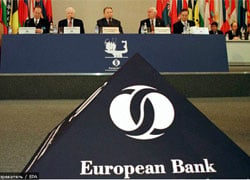EUobserver: The EBRD should refuse to cooperate with the autocrats
3- By Ionut Apostol, EUobserver
- 10.04.2012, 16:16

Before it moves into new countries, the bank would be well-advised to conduct extensive consultations with local civil society groups.
In recent weeks, the European Bank for Reconstruction and Development (EBRD) has been in the news as rarely before, with a few important questions being raised about its accountability.
For the first time in its 20-year history of promoting democracy and market economies in central and eastern Europe, the bank has decided to apply some democratic principles to the selection of its own president: five candidates are vying for the job, which until now has been filled after behind-closed-doors negotiations between its largest EU shareholders.
In the meantime, EUobserver has brought to light allegations that EBRD money has ended up in the pockets of people associated closely with the authoritarian regime Alexander Lukashenko in Belarus, raising some doubts over the verification mechanisms in place at the bank to ensure the public money it disburses actually benefits ordinary people in its theatre of operations.
Opening up the presidential selection process and dealing with allegations of having benefited the allies of a dictator has hopefully brought on some soul searching at the bank.
It would be a good time for the institution to take a look at itself - last year it turned 20 and this year it will expand its mandate from former Communist-controlled Europe to also promoting reform in post-Arab-Spring north African and Middle East countries.
An honest self-assessment is necessary because the bank's record in post-Communist countries is at best mixed and its new turf marks an increase in political responsibility.
There are a few areas to which it should pay particularly careful attention.
Firstly, while it is called a development bank, the EBRD still does not have solid means to measure the development impact of its operations. Too often, the transition record of a country is judged only in terms of the speed of privatisation and economic liberalisation reforms, failing to take properly into account human development and environmental goals. Before moving into a region where inequality has been one of the main drivers of revolutions, the bank must improve its vision of transition and development.
Secondly, the bank is mandated to promote sustainable development in its countries of operation, yet it continues to invest considerable amounts of public money into fossil fuels (for instance, in the new lignite unit at Sostanj in Slovenia) as well as into projects which affect protected natural areas (such as the Boskov Most and Ombla hydropower plants in Macedonia and Croatia). These kinds of investments must be eliminated.
Importantly, the bank also needs to re-evaluate its relationship with authoritarian regimes.
While the bank currently limits lending to countries such as Belarus and Turkmenistan, it continues to boast about its co-operation with the governments of Kazakhstan, Azerbaijan and Russia, where democratic principles are clearly not being implemented.
The expansion of the bank's mandate to post-Arab-Spring countries was - ironically - announced last year at the EBRD's annual meeting in Kazakhstan, hosted by the country's authoritarian leader Nursultan Nazarbayev. The bank's involvement with such regimes must be reassessed to ensure that its lending does not end up in the pockets of corrupt elites.
Before it moves into north African and Middle East countries, the bank would be well-advised to conduct extensive consultations with local civil society groups - not just the business community and politicians - to assess whether its involvement is indeed wanted and if so, in what form.
Ionut Apostol, EUobserver









